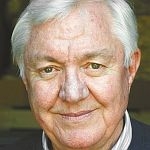 (HOST) President Barack Obama’s speech in Cairo yesterday contained many important messages to various constituencies. This morning, commentator and veteran ABC News diplomatic correspondent Barrie Dunsmore examines what the President told Israelis and Palestinians.
(HOST) President Barack Obama’s speech in Cairo yesterday contained many important messages to various constituencies. This morning, commentator and veteran ABC News diplomatic correspondent Barrie Dunsmore examines what the President told Israelis and Palestinians.
(DUNSMORE) What President Obama had to say to the Israelis and the Palestinians was more straightforward than anything I have heard from an American President for a very long time, if ever.
Obama was in no way apologetic about America’s strong bonds with Israel, which he described as "unbreakable." He condemned the destruction of six million Jews in the Nazi holocaust, and, clearly alluding to the president of Iran and other holocaust deniers, he said, "threatening Israel with destruction or repeating vile stereotypes about Jews is deeply wrong."
He called on the Palestinians to abandon their campaign of violence against Israel, saying, "violence is a dead end. It is a sign of neither courage nor power to shoot rockets at sleeping children, or blow up old women on a bus. That is not how moral authority is claimed; that is how it is surrendered."
But the President went on to express sympathy for the plight of the Palestinians. "(They have ) …suffered in pursuit of a homeland… They endure the daily humiliations that come with occupation… their situation is intolerable, and America will not turn our backs on the legitimate Palestinian aspirations… for a state of their own."
President Obama then criticized Israel’s policy of building settlements in the West Bank, the territory Palestinians envision as their future state. In Obama’s words, "the United States does not accept the legitimacy of continued Israeli settlements. It is time for these settlements to stop." By zeroing in on a settlements freeze, the President is addressing the issue which, if not resolved, will preclude there ever being a two-state solution.
Here’s the history. For the first decade after the ’67 Arab Israeli War, during which Israel captured sizeable parts of Arab land, there was very little settlement activity in the occupied territories – perhaps about ten thousand settlers, who were mostly orthodox Jews. With the election of the Likud Party of Prime Minister Menachem Begin in 1977, that changed – as the government started to offer large subsidies to settlers. That meant people living in a small apartment in Tel Aviv, for the same money could rent or even own a rather luxurious three-bedroom condo in a settlement, which came with the infrastructure of highways, schools and of course military security.
Every American President since Jimmy Carter tried to put a stop to the settlements, and every Israel government ignored Washington and kept on building. Now, including the settlements in East Jerusalem, there are nearly half a million Israelis living in a giant patchwork of settlements in the Palestinian West Bank – a land area about a quarter of the size of Vermont. Unless many of those settlements were to be abandoned, there really is no way that a viable, contiguous Palestinian State could be created – which is why a freeze on settlements is an absolutely crucial step if there is ever going to be peace.
President Obama has now clearly stated his preferences. The question remains, what is he prepared to do to make them happen?